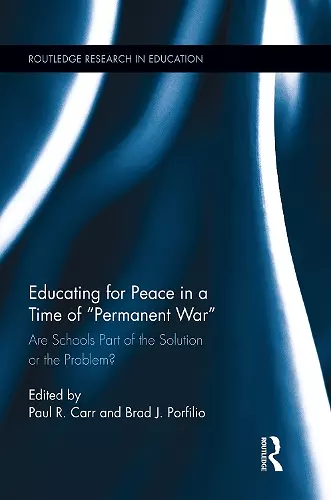Educating for Peace in a Time of Permanent War
Are Schools Part of the Solution or the Problem?
Paul R Carr editor Brad J Porfilio editor
Format:Paperback
Publisher:Taylor & Francis Ltd
Published:8th Jul '13
Currently unavailable, and unfortunately no date known when it will be back
This paperback is available in another edition too:
- Hardback£175.00(9780415899208)

What is the meaning of peace, why should we study it, and how should we achieve it? Although there are an increasing number of manuscripts, curricula and initiatives that grapple with some strand of peace education, there is, nonetheless, a dearth of critical, cross-disciplinary, international projects/books that examine peace education in conjunction with war and conflict. Within this volume, the authors contend that war/military conflict/violence are not a nebulous, far-away, mysterious venture; rather, they argue that we are all, collectively, involved in perpetrating and perpetuating militarization/conflict/violence inside and outside of our own social circles. Therefore, education about and against war can be as liberating as it is necessary. If war equates killing, can our schools avoid engaging in the examination of what war is all about? If education is not about peace, then is it about war? Can a society have education that willfully avoids considering peace as its central objective? Can a democracy exist if pivotal notions of war and peace are not understood, practiced, advocated and ensconced in public debate? These questions, according to Carr and Porfilio and the contributors they have assembled, merit a critical and extensive reflection. This book seeks to provide a range of epistemological, policy, pedagogical, curriculum and institutional analyses aimed at facilitating meaningful engagement toward a more robust and critical examination of the role that schools play (and can play) in framing war, militarization and armed conflict and, significantly, the connection to peace.
"The doomsday clock moves closer to midnight in a world that has gone mad with violence and perpetual war. The power of the military to manufacture and sanitize death, devastation and destruction has never been interrogated before by critical educators. Educating for Peace in a Time of Permanent War: Are Schools Part of the Solution or the Problem? is the first volume of its kind in which the militarization of education (both in curriculum and in the larger pedagogical order) is examined. This is an extremely important book that should be read by all educators."
- Karen Anijar, Professor Emeritus, Arizona State University
"In Educating for Peace in a Time of Permanent War" Are Schools Part of the Solution or the Problem?, editors Paul R. Carr and Brad J. Porfilio skillfully weave together and present the intellectual capital (the theory, philosophy and empirical work) of a set of international scholars par excellence. In five engaging sections – 'Theorizing Peace, War and Peace'; 'Scanning the War in Our Daily (and Educational) Lives'; 'The Curriculum of War and Peace'; 'Internationalizing Peace and the Trauma of War and Conflict'; and, 'Resisting the Militarization of Education' – and contextualized between the inspiring bookends of a Foreword by Antonia Darder and an Afterword by Zvi Bekerman, the authors explore virtually every aspect of the role of education in the drive for war and its perpetuation, and its equally liberatory potential in perusing its antithesis, peace. Any activist, student or academic working in the areas of peace, education, sociology, social justice or anti-imperialism – or anyone excited about the current world-wide push-back against the forces of oppression (neo-liberalism, authoritarianism, sexism, racism and homophobia) – would be remiss not to carefully read and consider the important thoughts and analyses proffered in this strikingly important volume!"
- Marc Pruyn, Senior Lecturer, Monash University
"In our shadowed time of military solutions to chronic problems, schools themselves mirror these means toward an end. The authors in this volume critically assess the role of schooling as a tool of governments and nation-building through analysis of the military mind and militarism in our teaching and learning. They find in the efficiency and surveillance of a modern nation-state a cast of mind and a portfolio of practices that seep inexorably down to authoritarian accountability measures in many schools today. I was particularly struck to realize that common means of peace education may be too weak or incomplete to counter the military mind and its accepted solutions to conflict, especially when the war machine becomes a major means to economic prosperity. The part of this volume devoted to classroom practices by critical peace educators around the world gave me some hope that teaching and learning in and out of schools may someday become generative, rather than reactive, incubators for a new life. This new life would be a way of being in the world that is not simply an altered cast of mind or an amended outlook. It would be a culture of peace-building that would begin to counter the suspicion of our relationships with one another, the violence of modes of being with non-human animals, and the exploitation of our planet."
- A. G. Rud, Dean and Professor, Washington State University
"The significance of this book is that, by contrasting with education for war, it offers optimism about the potential of education for peace by presenting concrete examples of alternatives, which indicate possible changes in perceptions of and attitudes towards war...The book conveys one coherent voice in problematizing the role of education in militarization and in proposing ways of demilitarizing and shifting education towards a path to peace."
-Noriko Sakade, Cambridge University
ISBN: 9780415712224
Dimensions: unknown
Weight: 590g
318 pages